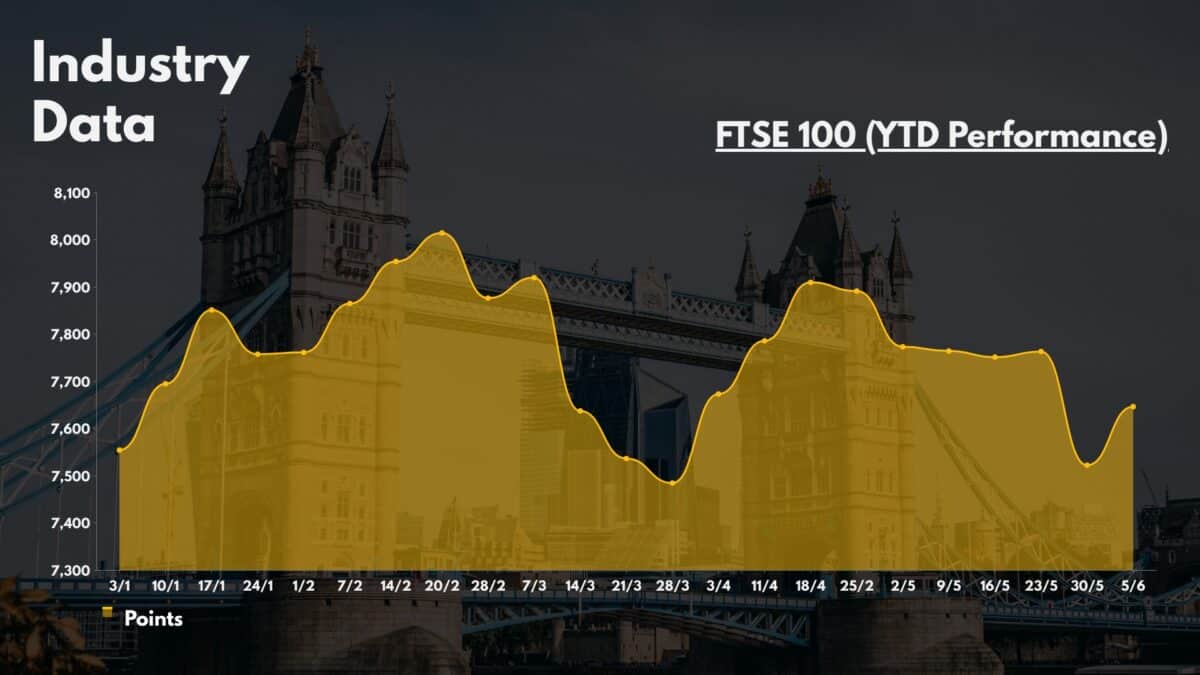The FTSE 100 had started the year on an encouraging note, hitting new highs in February. Nonetheless, stubborn inflation has trampled its progress, with Britain’s main index consolidating to lower levels since. So, why is it having so much trouble hitting and maintaining 8,000 points?

Inflated expectations
What caused the FTSE 100 to even hit 8,000 points to begin with? At that time, there was hope that inflation was indeed transitory, and that it was going to start plunging in the months to come. This would likely have caused the Bank of England to pause its rate-hiking cycle and cut rates later this year.
The theory is that rate cuts would eventually ease pressures on household income, subsequently encouraging spending and boosting stock prices. However, the opposite has come to pass instead, as inflation remains stickier than expected.
April’s CPI inflation print may have shown a modest drop, but the figure still came .5% hotter than forecast. As such, the FTSE 100 dropped a staggering 300 points in just a few days. Markets are now anticipating the central bank to only stop raising rates at 5.5%, from the 4.5% previously projected.
This isn’t good news for many of the FTSE 100’s top constituents. For instance, banks could see a rise in impairments from higher rates, which would dampen profits. Higher rates will also further spending in consumer staples and discretionary items, which will affect demand for material and industrials.
| Sector | Weight in FTSE 100 |
|---|---|
| Consumer staples | 17.9% |
| Financials | 17.8% |
| Materials | 13.4% |
| Industrials | 12.2% |
| Healthcare | 11.7% |
| Energy | 9.5% |
| Consumer discretionary | 6.9% |
| Communications | 4.3% |
| Real estate | 1.4% |
| Technology | 1.4% |
A pounding from foreign exchange
Another aspect that isn’t being discussed nearly enough is the prospect of further rate hikes strengthening the British pound sterling (GBP). A stronger GBP is beneficial in terms of getting cheaper imports, which will help to ease inflationary pressures.
That said, it’s not exactly a plus point for many FTSE 100 companies. This is because Britain’s top companies generate most of their profits from outside the UK. A more expensive pound could mean lower profits as conglomerates have to convert their earnings back into GBP.
All of the above cumulate and serve as tailwinds to many companies’ bottom lines. Hence, it’s no surprise that the FTSE 100 has been struggling to gain enough momentum to hit 8,000 points since February.
Are FTSE 100 shares worth buying?
On that basis, one could argue that this isn’t the best time to buy shares in the UK’s premier index. Nonetheless, I hold a contrarian view. I firmly believe that there’s no better time to buy UK shares than today.
It’s crucial to point out that the UK stocks have a habit of rebounding after every dip. Over the past year alone, the FTSE 100 has dipped a total of 10 times, and has rebounded every single time. And as Warren Buffett once said, buy when others are fearful.
In fact, there are a number of FTSE shares currently trading at tremendous discounts, with some of them even trading below book value. And considering that the FTSE 100 is currently trading below its long-term average P/E ratio of 15, I’d make the case that there’s no better time to buy UK shares than today.








